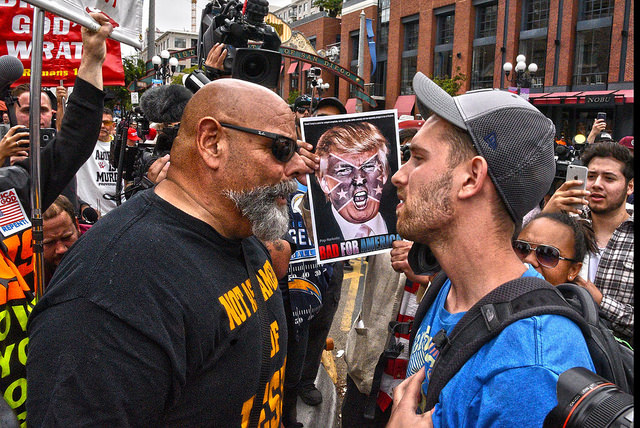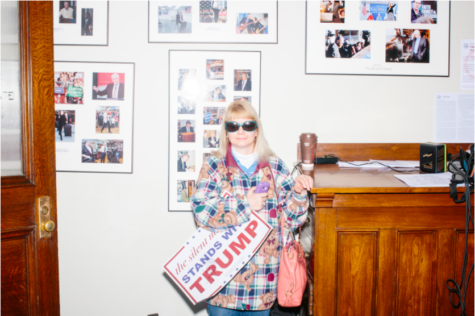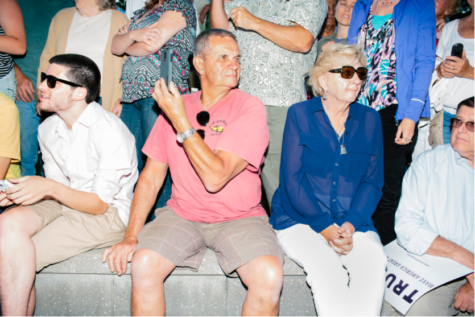 Well, there it is. The people have spoken and now the Electoral College has spoken and we have our new president, Donald J Trump.
Well, there it is. The people have spoken and now the Electoral College has spoken and we have our new president, Donald J Trump.
I strongly believe in the importance of an unbiased media – even if it’s just an ideal that we strive for and never really achieve. As journalists, I believe it’s crucial that we not be seen as taking sides. But it would be silly of me to pretend that I was unbiased about this election. I mean, I wrote a post speculating that our nation’s leader is secretly Latka from Taxi that became a weird sort of meme. And then I did it again because, I dunno, it was funny and the guy didn’t have a liberal’s chance in Texas of getting elected.
But he did and now I find myself in a difficult spot. Politics don’t revolve around science but they cross paths often enough, especially when it comes to conservation, climate, and energy. And as a journalist it’s my job to remain neutral and serve the truth as best I can.
But as a science journalist, it’s also my job to defend and uphold basic ideas in science like evidence, expert consensus, and impartial analysis of data. A sports writer may not root for a specific team but she does have to promote the sport and its best form of play.
So how do I go forward? Rail against Trump on Twitter? Keep silent? Break journalistic tradition and start donating to anyone who will oppose him? Every science journalist has to answer this for his or herself and I wouldn’t claim to have a monopoly on the correct way forward. But for myself, I’ve come up with a simple three-prong plan for the next four years.
1. I need to listen more.
 Like many in the media, I can honestly say I have no idea how Trump won. I don’t have many Trump supporters as friends and I don’t spend much time in Trump country. (Being based in Mexico City, I would argue that I’m not ideally placed for this.)
Like many in the media, I can honestly say I have no idea how Trump won. I don’t have many Trump supporters as friends and I don’t spend much time in Trump country. (Being based in Mexico City, I would argue that I’m not ideally placed for this.)
But as a journalist it’s my job to listen to all sides of any debate. When I write about fisheries collapse or aquaculture, I insist on talking to Mexican fishermen in a Baja fishing camp or a local Chinese carp farmers in Wuhan because they’re the people who are usually ignored. In fact, I’d argue any journalist who doesn’t get down to the everyday local level isn’t doing his job right.
So why should my own country be any different? Shouldn’t I be looking for overlooked opinions at home too? That means not trying to win arguments or convince people. That means not calling people stupid or looking for a choir to preach to. It means listening. It means opening myself to the possibility that maybe I have something to learn from people on the ground. Because no matter whose side you are on, you can’t argue that much of the media clearly wasn’t listening to the American people during the election.
2. Quote people from a different pool of experts.
In any given science story there are certain people who I need to quote because they are intrinsic to the story or overwhelmingly expert on the topic. But there are often those people I just reach out to so as get a different perspective. Usually they are from fancy universities on the coasts. I need to be better at calling people from the Montana State University, the University of Iowa and the University of Arkansas.
This is not about fitting square pegs into round holes, this is about getting a wider sense of the country. Now, your average red state professor may not see the world all that differently from my own point of view, but at least it’s a start. And in my experience, heartland professors may be liberal but they understand what their neighbors think and believe better than I do.
#3 Defend evidence-based thinking with everything I have.
I’ve read that we are in a post-fact world. I have no idea what this means, nor do I wish to. As a journalist, it’s my entire job to follow the facts and that’s not going to change. But this starts with my own biases. For instance, a part of me honestly thinks that Russia handed the election to Trump through hacking and who-knows-what secret backroom deals. They didn’t. Trump crushed Hillary in more than just Pennsylvania and Wisconsin. He beat her in Florida, North Carolina and Ohio – all places that were theoretically hers for the taking if she had made a better case to their inhabitants.
But it doesn’t stop with my own willingness to overlook the facts. We live in a time where esteemed experts can be overruled by neophytes and a lunatic’s opinion on Twitter is as good as someone who has spent their life probing the deepest mysteries on Earth. That’s got to stop. Evidence matters – if you read this blog, you know that. And some issues are too complicated for the layman to understand fully, which is why we pay people to get PhDs and understand them better.
I’m not a political writer and I never want to be one. Truth be told, it’s a lousy beat. And besides, nobody cares what science writer Erik Vance thinks about policy or who he thinks should be president. Nor am I interested in political advocacy. I’ve worked in that world before – it’s an important profession and essential for a vibrant democracy but it’s not what I do now.
I’m a journalist and that means I strive to be neutral. And if I fail to be, then I try again harder next time. It also means I am an advocate for logical, evidence-based thinking and that it’s my job to promote science and reason wherever I can. And fight willful ignorance with whatever limited power I can muster.
So that’s it. In some ways, my job hasn’t really changed. I need to listen, I need to get the whole picture, and I need to represent the scientific method to the best of my ability. It’s still my job to represent the truth and speak to readers of all stripes so that’s what I’m going to do.
Whether they are listening to me or not.
Photo Credit: Creative Commons and the amazing Scott Brauer. Seriously, you have to check out his project, This is the Worst Party I’ve Ever Been To.
